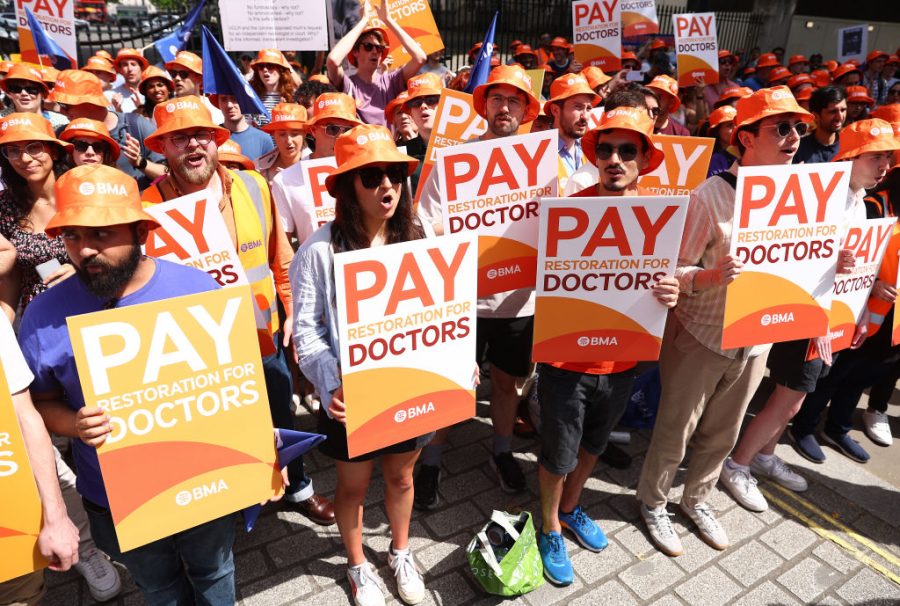Did anyone really think that the incoming Starmer government was going to appease the public sector unions for long by stuffing their mouths with gold – awarding them fat pay rises without any requirement to improve productivity? When he awarded junior doctors a pay rise of 22 per cent last July, Wes Streeting told us that he had made more progress in days than the Conservatives had made in months. The strikes were over, thanks to grown-up government.
Not so fast, Wes. Predictably enough, the government’s largesse towards towards the unions has merely served to embolden them. Now they are back for more – and the government finds itself unable to satisfy them.
In the NHS, it is an all-out war of envy, entirely divorced from fiscal reality
Pay rises announced this week have gone well beyond what Rachel Reeves was telling us a few weeks ago were unaffordable. The Chancellor had told us that 2.8 per cent was the limit. Yet nurses have been offered 3.6 per cent, consultants 4 per cent and junior doctors (who now demand to be called ‘resident doctors’ in case we realise they are still in training) up to 6 per cent. Think they might be pleased? Er, no.
The BMA is threatening strikes once again. As it did last year, it is still demanding that junior doctors’ pay be restored to a mythical figure it says they were being paid in real terms in 2008 (a figure the BMA arrives at by using the Retail Prices Index rather than the Consumer Prices Index; the IFS suggests that the real-terms fall in pay since 2008 – a date chosen because doctors enjoyed a hefty pay rise that year – is half what the BMA claims). The BMA has demanded another 10 to 20 per cent this year.
Unsurprisingly, the nursing unions, who settled their own pay dispute last year before Labour took office, remain aggrieved that they received a lower pay rise than the doctors did. The grievance has been compounded by their being offered a lower pay rise than junior doctors once again. In the words of Nicola Ranger, General Secretary of the Royal College of Nursing, ‘It is a grotesque decision to again favour doctor colleagues for higher increases than nursing and the rest of the NHS.’
In the NHS, in other words, it is an all-out war of envy, entirely divorced from fiscal reality. The wider context, of which the unions appear to have no insight – or at least choose not to – is that the government is already running a £150 billion deficit and tax rises are failing to deliver enough extra revenue to pay for last year’s public sector pay rises (in spite of damaging employment in the private sector).
Moreover, productivity is lagging. According to NHS England itself, productivity is still 8 per cent lower than it was pre-pandemic (although it has risen over the past year). To put it bluntly: NHS staff are demanding to be paid substantially more in real terms than they were six years ago while producing markedly less value.
No economy can thrive on this basis: it is recipe for an inflationary spiral. The only thing which stops that happening is that, thankfully, we have a private sector where a greater sense of reality reigns, and workers accept that if they cannot produce more they will not be paid more.
Somehow, that message needs to be drummed into public sector unions who seem to think they have a God-given right to above-inflation pay rises, come what may. Sadly, it isn’t going to be this government which gets that message home. Last year’s unwarranted pay awards in the public sector have compromised the government’s efforts to appeal to reason – and condemned us to another four years of union militancy.








Comments